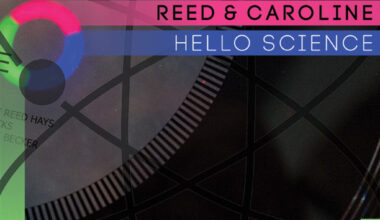Post-punk stalwart Graham Dowdall continues his electronaut explorations

Graham “Dids” Dowdall, a former member of Mancunian art terrorists and Morrissey faves Ludus, has chalked up collaborations with luminaries like Nico and John Cale and now resides among the ranks of recently revitalised cult experimentalists Pere Ubu. Those are impeccable post-punk credentials, you’d have to agree. But there’s precious little evidence of them in his solo electronic work under the Gagarin banner. It’s almost as if a lifetime spent making jagged, discordant rock music requires a powerful antidote, namely the construction of serene, soothing electronica.
The accompanying blurb for ‘Aoticp’, the latest in a succession of Gagarin albums, claims Dowdall makes “instrumental electronica that doesn’t adhere to any particular scene or style”. That may well be true – at least there’s not much in the way of slavish adherence to traditional dance music genres here. But equally, and despite the fact he probably won’t like us doing so, you’d have to place this squarely in the left-field ambient folder. There are clear echoes of the chilly rather than chilled electronics of Autechre and Aphex, with perhaps a twist of the post-industrial sensibilities of Kevin Martin’s 1994 ‘Isolationism’ compilation and the sonic purity of Pete Namlook’s Fax label output.
In other words, if those reference points are your kind of music, then you’re in for a treat, as Gagarin is more than capable of reaching the lofty heights of the very best that this most horizontal of musical movements has to offer. He’s also got the versatility to keep your attention over the 11 tracks contained on ‘Aoticp’, shifting moods like weather moving over rugged countryside.
Its extremities are its true highlights. ‘Homeservice’, for example, layers background ambience and understated interference to create an unsettling, restless piece, which immediately transports you and keeps you enthralled throughout, despite on the surface not doing very much at all. The thuggish drum machine thumps and caustic pops and crackles of ‘Bakelite’, on the other hand, are all action, built around a few exultant rave stabs possibly half-inched from Orbital’s tour van the last time they were parked up outside an arena, but really put through the drill ‘n’ bass mincer.
This couldn’t be further from the sweeter, more melodically simple moments on ‘Aoticp’. The album’s opener, ‘Ammil’, is intriguing enough to keep you listening, but operates on a mere handful of interweaving chords, a couple of frisky polyrhythmic counterpoints and the occasional note soaring majestically above the mix. It’s not too clever for its own good and is a highly effective overture. Likewise, ‘Hilversumi’ starts out sounding like a mouse running up and down the studio keyboard when the DAT machine was left on record after hours, but is steadily drawn into focus aided by austere, phasing synth strings. The result is as atmospheric and emotionally turbulent as one of Mike Paradinas’ finest tracks.
If you thought this end of the electronic music spectrum reached its creative peak in the mid-90s and stopped moving forward shortly afterwards, then Gagarin’s esoteric sound palate and deft hand at crafting a melody will prove you very, very wrong. Ladies and gentlemen, we are floating in space once again.





